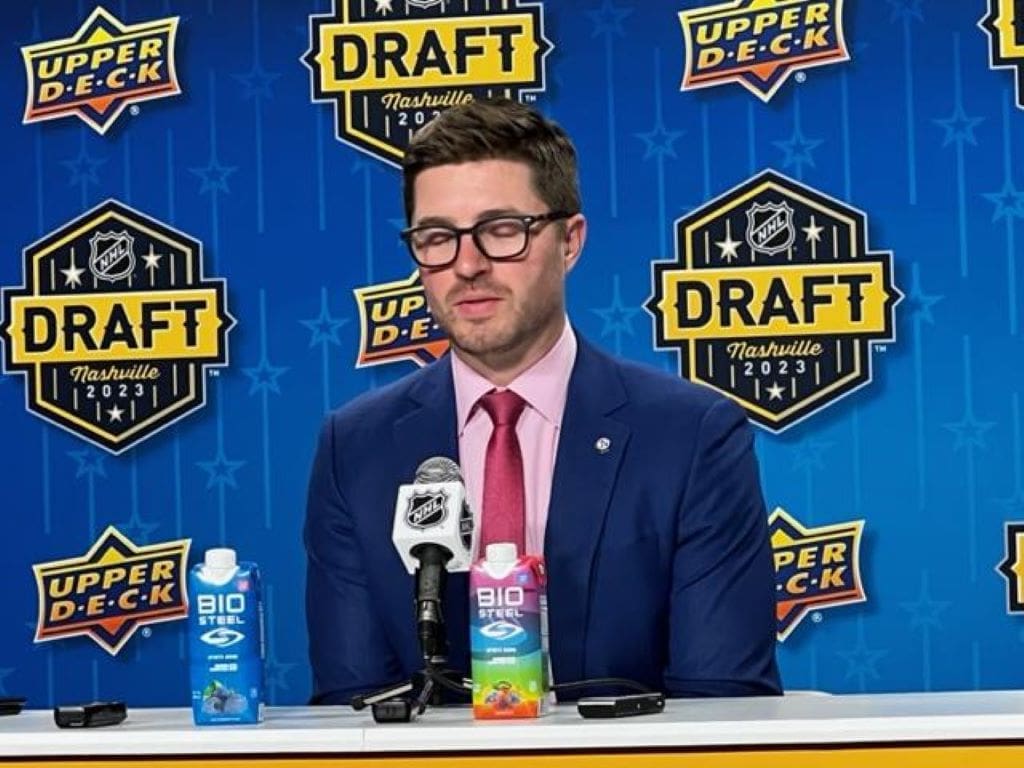Penguins
Molinari: Double-Duty GM Risky for Penguins, Dubas

It’s been clear since the day Kyle Dubas was hired that he would be the guy in charge of the Pittsburgh Penguins’ hockey operations.
What wasn’t so obvious — and certainly was not expected at the time — was that Dubas, who was named president of hockey ops on June 1, would take on the permanent role of general manager, too.
Dubas said then that, with the NHL Draft and free-agency signing period just weeks away, he would be GM on an interim basis, which was perfectly logical. Even if he had managed to find the ideal GM candidate almost immediately, odds are that whoever he hired would have been compelled to operate under restrictions imposed by the team that gave Dubas clearance to hire someone from its front office.
He added that he expected the field of prospective GMs to expand July 1, presumably because contracts would be expiring then.
Although it isn’t known how many candidates he considered — before or after July 1 — the one Dubas ultimately decided was best to fill the GM role was a guy he saw every day.
In his mirror.
His credentials for handling those duties are beyond reproach; he earned league-wide respect for his work during five years as GM in Toronto.
Certainly, there were blemishes on his record — trading for Pittsburgh Penguins alum Matt Murray in 2022 in the belief that he could become the Maple Leafs’ go-to goalie, for example — but even the most accomplished GM is guilty of an occasional blunder.
(Let’s not forget that Craig Patrick, widely regarded as the finest GM in Penguins history, swapped Markus Naslund for Alek Stojanov.)
Although some of Dubas’ fellow GMs probably own socks that are older than he is — Dubas is 37, and nearly a full year younger than Penguins center Jeff Carter — his relative youth seems to be mostly an asset. He comes across as vigorous and enthusiastic, qualities that appear to be contagious with those who work for him.
But it is those colleagues who might make the most compelling case for Dubas to have resisted the temptation to take on the GM role permanently.
Maybe — maybe — his prospects for successfully handling the responsibilities of two very demanding positions would be enhanced if he had a more experienced staff on which to lean. If, for example, he had brought in Brandon Pridham, his assistant GM in Toronto, with whom he seemed to have such a productive relationship.
Now, had Dubas given the GM title to someone, be it Pridham or anyone else, that individual would have had to be willing to suppress his/her ego because there has been no question that Dubas will be the final authority on all hockey ops matters, including those on which the GM normally is the decision-maker.
At the very least, though, bringing in another person would have provided another perspective on issues facing Dubas.
As it is, his top lieutenant is assistant GM Jason Spezza, who was an exceptional center but is entering just his second season in management. After that, Dubas has Trevor Daley and Amanda Kessel, who are listed as his “special assistants.”
All three were outstanding players, seem to have real hockey acumen, and could develop into high-quality executives, but their combined front-office experience is, to be charitable, modest. Dubas presumably will lean on Mike Sullivan and his assistants from time to time, but the coaches have other responsibilities.
Simply put, failing to add another voice — ideally, belonging to someone who has navigated a few management mazes over the years — to the front-office mix could prove to be a costly, unforced error.
Especially when Dubas has been given the seemingly impossible mandate of transforming the Penguins into instant Stanley Cup contenders while simultaneously restocking their prospects pool. If his challenge was any more daunting, he might get a good-luck note from St. Jude.
For a lot of reasons, Dubas was a good choice to be the Pittsburgh Penguins’ president of hockey operations. Or their GM.
Just not both.


